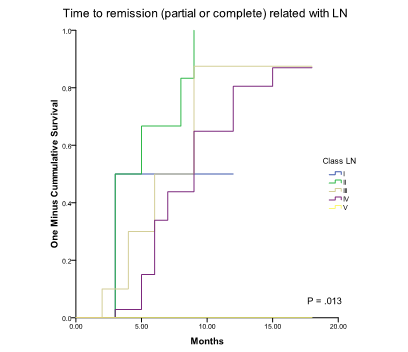Session Information
Session Type: Abstract Submissions (ACR)
Background/Purpose
Incidence and disease pattern of childhood-onset systemic lupus erythematosus (SLE) is reported to differ among ethnic groups. Lupus nephritis (LN) strongly affects the outcome in children with LES systemic lupus erythematosus (SLE). There are lack of data on the clinical course, long-term outcome and predictors of disease progression in mexican children. This study reports the results and outcomes of a cohort of Mexican patients with LN.
Methods
To describe lupus nefritis pattern and follow-up of a cohort of 61 Mexican children with SLE in the Hospital Infantil de Mexico Federico Gomez during a 18-month period in 2013-2014. Descriptive data, parametric, non parametric statistics and Kaplan-Meier graphs was used to analyze disease remission.
Results
The mean age at diagnosis was 12.4 years (SD = 2.6), most of them was female (85%) and 51 (83%) presented nephritis at the time of LES diagnosis. The mean plasma creatinine was 0. 8 (SD 0.4) and 24 (39%) patients presented with nephritic syndrome. Renal function was reported with a median proteinuria 41 mg/m2TBS/h (0 – 735) and 53 (86.9%) presented with positive urinary sediment. Complement was diminished in the most of the patients. Class IV LN was the most prevalent (62%).
Treatment was based on cyclophpsphamide IV pulses alone or combined with oral either azathioprine or MMF. The patients completed a mean follow-up of 8 months, 26 (42.6%) patients were in complete remission and 15 (24.6%) were in partial remission. Two patients needs to move to rituximab treatment.
Mean time to remission (either complete or partial) was 9 months (SD 0.6) and the best outcome was related with class II LN (Figure, P = .013).
Conclusion
The current study provides outcome data on a mexican pediatric population with LN and underlines the importance of prescribing appropriate induction treatment to all children, also we identify that class II LN presents the best outcome in our patients.
Disclosure:
M. D. R. Maldonado-Velázquez,
None;
E. Faugier,
None;
F. Garcia-Rodriguez,
None;
P. Lara,
None;
A. Flores,
None;
J. Tomala-Haz,
None;
D. Salinas-Encinas,
None.
« Back to 2014 ACR/ARHP Annual Meeting
ACR Meeting Abstracts - https://acrabstracts.org/abstract/lupus-nephritis-in-mexican-children/

